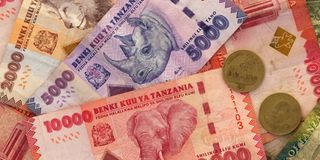Closely monitor falling of shilling, experts caution

What you need to know:
- Tanzanians will now have to dig deeper into their pockets to pay for imports and finance the national debt as the value of the national currency keeps depreciating against the US dollar.
Dar es Salaam. Tanzanians will now have to dig deeper into their pockets to pay for imports and finance the national debt. This is basically on account of the relentlessly depreciating value of the national currency, the shilling against the United States dollar.
A random survey of some bureaux de change in the nation’s commercial capital Dar es Salaam yesterday established that the dollar was sold at up to Sh2,415. This is the lowest level to which the local currency has declined in the last three years and seven months.
In the same vein, commercial banks sold one dollar at Sh2,436, up from Sh2,298 at the end of last week.
Impact
Prof Honest Ngowi of Mzumbe University’s Economics Department told The Citizen that importation costs would escalate.
Almost inevitably, he said, businesses would transfer the extra costs onto consumers by increasing prices as a matter of course.
“Depreciation of the shilling can distract the implementation of individual, organisational and government budgets,” Prof Ngowi warned, adding that “confidence in the shilling would fall. This is bad for the country.”
He also said that the cost of financing the national debt would go up, even without having borrowed more.
This would adversely affect the implementation of development projects in such crucial sectors as Health, Education and Infrastructure.
Dr Charles Sokile is the managing director of Oxford Policy Management (OPM) in Tanzania, a research institution. He said that, if the currency depreciation is not effectively addressed, it would also increase domestic production costs, as manufactures would have to import raw materials at higher prices.
“Eventually, the consumer will suffer the consequences. Locally produced goods would become uncompetitive at the marketplace,” he warned.
These sentiments were echoed by a reputable business consultant and economist, Dr Donath Olomi, who said that, without stability in exchange rates, businesses would suffer.
Why the depreciation?
Prof Ngowi attributed the trend partly to a decrease in export volumes of cashew nuts, as a result of a delay in the commencement of exports.
Earnings from cashew nut exports decreased by 62.9 per cent during the year that ended on December 31, 2018, compared to the same period a year before – falling to $196.5 million (Sh472 billion).
Prof Ngowi also linked the depreciation with the recent crackdown by the Bank of Tanzania (BoT) on bureaux de change, which saw to a decrease in supply of the greenback.
For his part, Dr Sokile attributed the drop in value of the shilling to massive infrastructural development projects like the Standard Gauge Railway and Stiegler’s Gorge hydropower station, whose implementation require the use of dollars.
He also said that strengthening the business environment during the past two years – which saw to the closure of some businesses – had a hand in the depreciation of the national currency.
The drop is also partly attributable to the decline in foreign direct investments (FDIs) for the third year running.
According to the United Nations Conference on Trade and Development (Unctad), FDI flows to Tanzania dipped by 24.4 per cent in 2017, to $1.18 billion (Sh2.8 trillion), compared with the 2015 level.
Solution
Prof Ngowi called for more exports in terms of volume and quality, to earn more foreign exchange.
To that end, he suggested creation of a friendly environment that would attract more tourist dollars.
Calling for modest remittance costs to encourage more Tanzanians in diaspora to send money to their motherland, Prof Ngowi also suggested improving relations with donor countries and other development partners.
Dr Sokile was of the view that the government should closely monitor the situation to enable it decide whether or not intervention by releasing more dollars to stabilise the shilling would be the best option. He also urged the government, working through the Tanzania Trade Development Authority (Tantrade) to encourage more exportation.
For his part, Dr Olom, stressed that the government should create a business-friendly climate by removing obstacles, thus spurring both local and foreign investments.
In late January this year, BoT said the shilling was not in a crisis, explaining that the current movement in the exchange rate was a seasonal phenomenon related to low foreign exchange earnings from tourism and crop exports.
“This is a common trend that usually normalizes in the second half of the year when earnings from tourism and exports pick-up,” reads the central bank’s statement in part.




